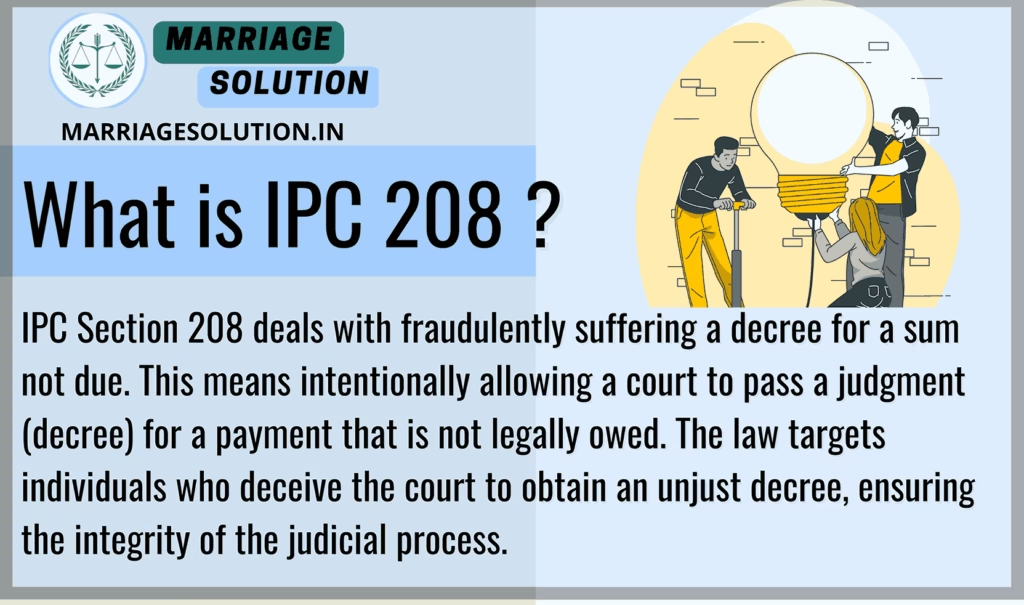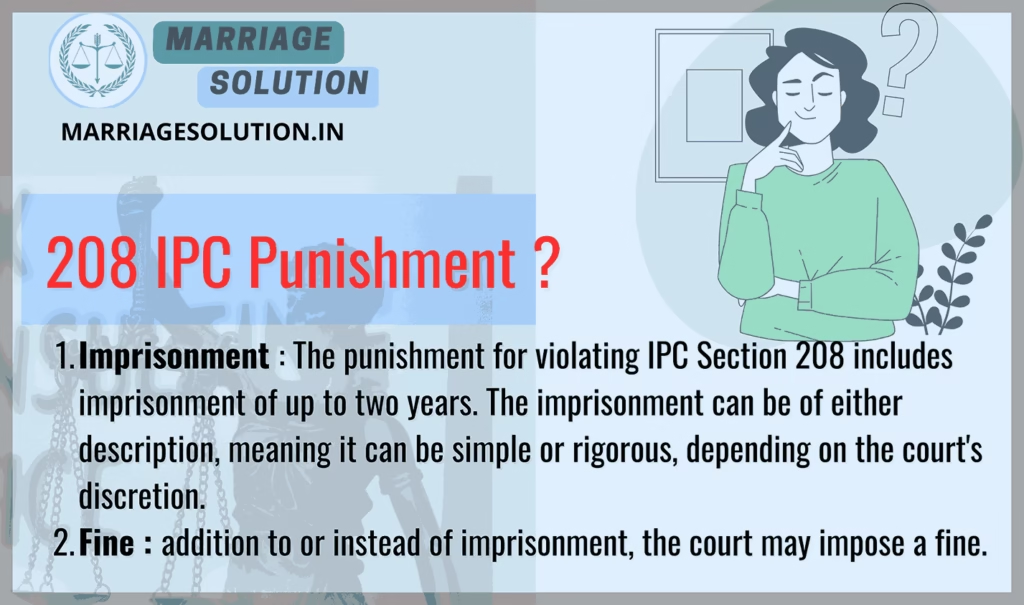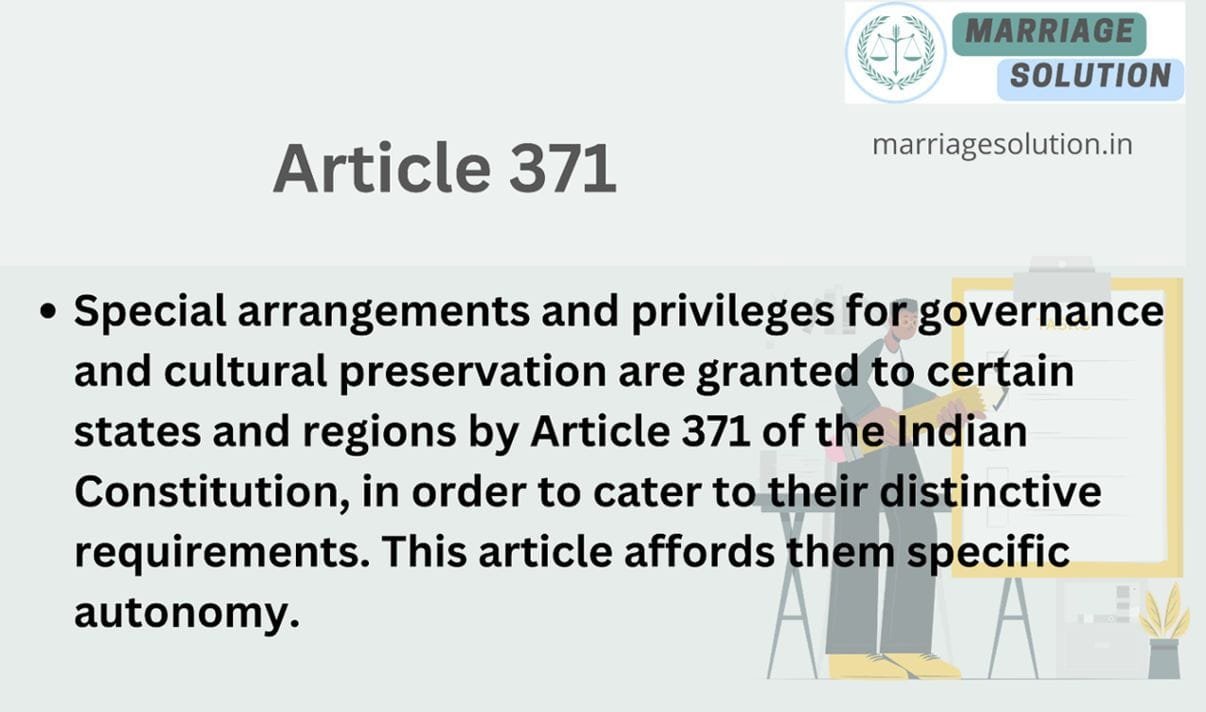Introduction of IPC 208
IPC 208 is designed to prevent the misuse of the judicial process. It ensures that court decrees are based on genuine claims and not obtained through fraud or deception. The law applies when someone intentionally allows a court to pass a judgment for a payment they do not owe, undermining the fairness of legal proceedings. It upholds the integrity of the legal system by penalizing fraudulent practices.
- Introduction of IPC 208
- What is IPC Section 208 ?
- Section 208 IPC in Simple Points
- IPC 208 Overview
- Section 208 IPC case laws
- 208 IPC Punishment
- 208 IPC Bailable or non bailable
- Section 208 IPC in short information
- IPC Section 208 FAQs
- If you need support with court proceedings or any other legal matters, don’t hesitate to reach out for assistance.
What is IPC Section 208 ?
IPC Section 208 deals with fraudulently suffering a decree for a sum not due. This means intentionally allowing a court to pass a judgment (decree) for a payment that is not legally owed. The law targets individuals who deceive the court to obtain an unjust decree, ensuring the integrity of the judicial process.

Section 208 IPC in Simple Points
- Fraudulent Suffering of Decree
Section 208 IPC makes it illegal to knowingly allow a court to pass a decree for a payment that is not legally owed. The act must involve fraudulent intent. - Sum Not Due
The law applies when the decree is for a sum not due, meaning the payment is not legally owed. This could include false claims of debt, damages, or other financial obligations. - Punishment
The punishment includes imprisonment for up to two years, a fine, or both. The court decides the severity based on the case. - Bailable Offense
Offenses under Section 208 IPC are bailable, meaning the accused can seek bail and be released while awaiting trial. - Non-Cognizable Offense
It is a non-cognizable offense, meaning the police cannot arrest the accused without a warrant and require prior permission from a magistrate to investigate.
IPC 208 Overview
IPC Section 208 defines the offense as fraudulently suffering a decree for a sum not due. This includes knowingly allowing a court to pass a judgment for a payment that is not legally owed, with the intent to deceive or defraud. The law applies to both civil and criminal cases where fraudulent decrees are obtained.
IPC Section 208 Explained: 10 Key Points
- What is IPC Section 208?
IPC Section 208 deals with fraudulently suffering a decree for a sum not due. This means intentionally allowing a court to pass a judgment (decree) for a payment that is not legally owed. The law targets individuals who deceive the court to obtain an unjust decree.
- Fraudulent Intent is Essential
For an act to fall under Section 208 IPC, the accused must have acted with fraudulent intent. This means they knowingly and deliberately allowed the court to pass a decree for a payment they did not owe. Without this intent, the act may not be punishable under this section.
- Suffering a Decree
The term “suffering a decree” refers to allowing the court to pass a judgment without contesting it, even though the claim is false or unjust. For example, if someone knowingly allows a court to order them to pay a debt they do not owe, they violate Section 208 IPC.
- Sum Not Due
The law applies when the decree is for a sum not due, meaning the payment is not legally owed. This could include false claims of debt, damages, or other financial obligations. The accused must have knowingly allowed the court to pass such a decree.
- Punishment Under Section 208 IPC
The punishment for violating Section 208 IPC includes imprisonment of up to two years, a fine, or both. The court decides the severity of the punishment based on the circumstances of the case. This provision acts as a deterrent against fraudulent practices.
- Non-Cognizable Offense
Section 208 IPC is a non-cognizable offense, meaning the police cannot arrest the accused without a warrant. Prior permission from a magistrate is required to initiate an investigation. This protects individuals from arbitrary arrests.
- Trial by Magistrate
Cases under Section 208 IPC are tried by a Magistrate of the First Class. The magistrate oversees the proceedings and ensures that the case is handled fairly. The trial process involves examining evidence, hearing witnesses, and determining guilt or innocence.
- Objective of the Law
The primary objective of Section 208 IPC is to prevent the misuse of the judicial process. It ensures that court decrees are based on genuine claims and not obtained through fraud or deception. The law upholds the integrity of the legal system.
- Examples of Offenses
Examples include allowing a court to pass a decree for a fake debt, falsely admitting liability for damages, or knowingly permitting a court to order payment for a sum not owed. These actions undermine the fairness of legal proceedings.
2 Examples of IPC Section 208
- Example 1: Fake Debt Decree
A person knowingly allows a court to pass a decree ordering them to pay a debt they do not owe. They do this to help a friend claim money fraudulently. This act falls under IPC Section 208. - Example 2: False Liability Admission
In a civil case, a person falsely admits liability for damages and allows the court to pass a decree against them, even though they are not responsible. This fraudulent act violates IPC Section 208.
Section 208 IPC case laws
- Case: State of Maharashtra v. Rajesh Kumar (2015)
- Facts: The accused fraudulently caused a false summons to be issued, leading to a wrongful decree against the complainant.
- Result: The court convicted the accused under IPC Section 208 and sentenced him to 1 year of imprisonment and a fine. The court emphasized the fraudulent intent behind the act.
- Case: Ramesh Chand v. State of Uttar Pradesh (2010)
- Facts: The accused manipulated court processes to execute a decree for a sum not legally due.
- Result: The court found the accused guilty under IPC Section 208 and imposed a sentence of 6 months imprisonment and a fine. The court highlighted the misuse of judicial processes.
- Case: Suresh Kumar v. State of Rajasthan (2018)
- Facts: The accused fraudulently caused a false notice to be issued, leading to a wrongful decree.
- Result: The court convicted the accused and sentenced him to 1.5 years of imprisonment. The court noted the deliberate attempt to deceive the judicial system.
- Case: Vinod Sharma v. State of Madhya Pradesh (2012)
- Facts: The accused was involved in fabricating documents to execute a fraudulent decree.
- Result: The court convicted the accused under IPC Section 208 and sentenced him to 2 years of imprisonment. The court stressed the importance of maintaining the integrity of judicial processes.
- Case: Anil Kumar v. State of Haryana (2019)
- Facts: The accused fraudulently caused a false summons to be issued, leading to a wrongful decree against the complainant.
- Result: The court convicted the accused and sentenced him to 1 year of imprisonment and a fine. The court reiterated the need to deter fraudulent practices in legal proceedings.
208 IPC Punishment
- Imprisonment
The punishment for violating IPC Section 208 includes imprisonment of up to two years. The imprisonment can be of either description, meaning it can be simple or rigorous, depending on the court’s discretion. - Fine
In addition to or instead of imprisonment, the court may impose a fine.

208 IPC Bailable or non bailable
IPC Section 208 is a non-bailable offense. This means the accused cannot claim bail as a matter of right, and it is at the discretion of the court to grant bail based on the facts and circumstances of the case.
Section 208 IPC in short information
| IPC Section | Offense | Punishment | Bailable/Non-Bailable | Cognizable/Non-Cognizable | Trial By |
|---|---|---|---|---|---|
| 208 | Fraudulently suffering a decree for a sum not due. | Imprisonment up to 2 years, or fine, or both. | Bailable | Non-Cognizable | Magistrate of the First Class |
IPC Section 208 FAQs
What is the punishment under IPC Section 208?
The punishment for an offense under IPC Section 208 is imprisonment of up to 2 years, or a fine, or both.
Is IPC 208 a cognizable offense?
Yes, IPC Section 208 is a cognizable offense, meaning the police can arrest the accused without a warrant.
What is the intent required for an offense under IPC 208?
The intent must be fraudulent, meaning the accused knowingly and deliberately caused a false summons or notice to be issued.
Can IPC 208 be compounded?
No, IPC Section 208 is a non-compoundable offense, meaning the parties cannot settle the matter privately without court intervention.
Who can file a complaint under IPC 208?
A complaint can be filed by the person aggrieved by the fraudulent act or by a public servant acting in the course of their duty.
If you need support with court proceedings or any other legal matters, don’t hesitate to reach out for assistance.
Court or any other marriage-related issues, our https://marriagesolution.in/lawyer-help-1/ website may prove helpful. By completing our enquiry form and submitting it online, we can provide customized guidance to navigate through the process.
Right to Information RTI act :Your Comprehensive Guide (Part 1)
The Right to Information (RTI) Act : Explore the essence of the Right to Information (RTI) Act through this symbolic image. The image features legal documents, emphasizing the importance of transparency and accountability in governance. The scales of justice represent…
What is Article 371 of Indian Constitution ?
Article 371 of the Indian Constitution grants special provisions to specific states and regions within India, addressing their unique historical, social, and cultural circumstances. These provisions aim to accommodate diverse needs and protect cultural identities within the constitutional framework.
Indian Labour law : Your Comprehensive Guide (Part 1)
The purpose of labour laws is to safeguard employees and guarantee equitable treatment at the workplace, encompassing aspects such as remuneration, security, and perks. These regulations establish a secure ambiance by imposing minimum wage requirements, ensuring factory safety measures are…
GST :Your Comprehensive Guide (Part 1 – Understanding the Basics)
The Goods and Services Tax (GST) is like a big change in how we pay taxes in India. It started on July 1, 2017, and it’s here to simplify things. Before GST, we had many different taxes, and it could…





